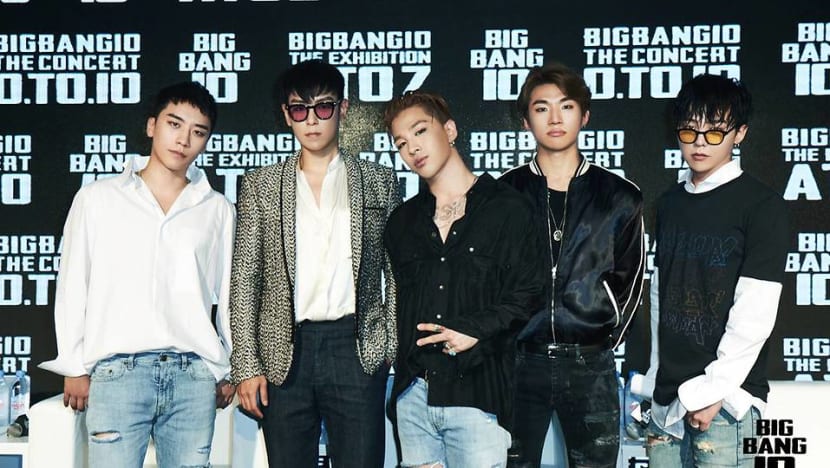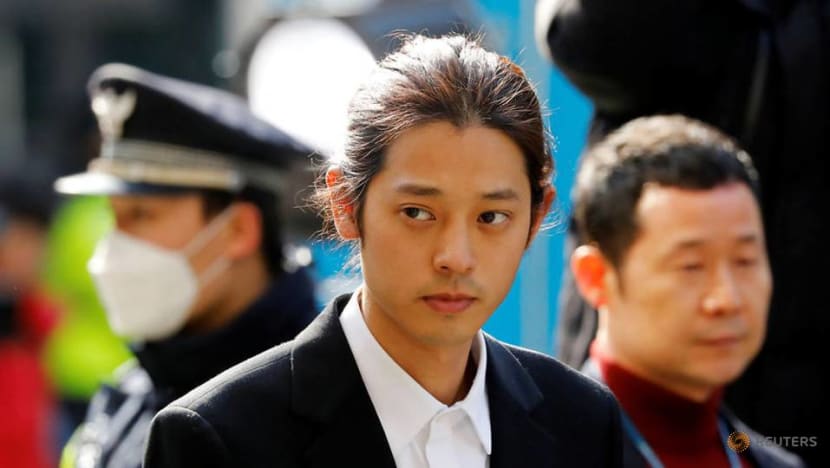commentary Commentary
Commentary: BIGBANG’s Seungri’s sex scandal and the end of K-pop’s innocence
A series of high-profile sex scandals and other offences has rocked the South Korean music industry, but will the reckoning be enough to provoke true change?

BIGBANG boyband member Seungri - real name Lee Seung-hyun - had been embroiled in a sex-for-investment criminal investigation (Photo: AFP)
SEOUL: Finding himself at the centre of a snowballing sex scandal, Seungri, a member of K-pop sensation Big Bang, took to his Instagram page to do what celebrities typically do when under fire for wrongdoings: Apologise and pledge to reflect.
But, in his statement, Seungri went further than the usual expressions of contrition and promises to work harder and be better. He, at all of 29-years-old, said that he would immediately retire from show business, leaving his group and permanently ceasing all entertainment activities. The “honour” of his band and management company were in danger, Seungri wrote, and he saw no way of continuing his career.
Seungri is reeling from allegations that he had arranged prostitution for prospective investors in a nightclub and that he was part of a group chat where members shared sexual videos taken without the consent of the women who appeared in them.
Though he has yet to be formally charged, Seungri is not denying the charges against him. He is the best-known of several male entertainers currently being questioned in similar scandals.
FALL FROM GRACE
Regardless of how the police investigation and subsequent legal process play out, it is a precipitous fall from grace for Seungri, who has had a more-than-decade-long run as part of BIGBANG, one of the brightest lights that turned K-pop into the global phenomenon and commercial force it is today.
The scandal has been front and centre all over the South Korean news over the week, far outstripping the latest North Korea-related rumblings in terms of public interest, and has been met with strong emotions.
To start with, K-pop has long been characterised by an uncomfortable duality: The acts are marketed domestically and overseas as wholesome and pure fresh-faced kids who practise hard to do their best at entertaining and setting a positive example for young fans.
Unlike pop music in the West, K-pop lyrics contain no overt references to sex or drug use, and performers are contractually obligated to remain strictly under their management’s control, with little freedom or time off. To maintain their innocent images, K-pop idols aren’t even allowed to openly date.
But beneath that glossy exterior, there has long been a unseemly underbelly to the industry. K-pop has long been dogged by rumours that young, aspiring female entertainers were pressured to provide sexual services for wealthy, well-connected men.
READ: It's not me - South Korean female stars rush to deny K-pop sex videos

SHAME AND EMBARRASSMENT
The currently unfolding scandal is the largest ever to hit the industry, and could amount to an end of innocence for K-pop. From now on, it could be harder for the small number of big management companies (one of which, YG Entertainment, recently cut ties with Seungri) to market their acts as wholesome.
Also, South Korea is currently in the midst of an epidemic of what in Korean is called “molka,” videos of sexual or intimate moments taken without a woman’s knowledge then distributed online. Seungri, singer Jung Joon-young and other entertainers allegedly operated a group chat room where such videos were shared.
Local media reports say that members of the group chat watched the videos and made dark comments on the footage of sexual acts committed on unconscious women. Jung has admitted to sharing videos he took of several women he slept with, and, like Seungri, has announced his retirement.
When they appeared for police questioning in Seoul, both Jung and Seungri apologised to the people of South Korea. K-pop is South Korea’s most popular cultural export, and entertainers are expected to serve as ambassadors for the country overseas.
Korean-language social media and website comment sections are now filled with South Koreans expressing shame and embarrassment, feeling as though the men’s acts bring shame on them and their country.
The alleged perpetrators will have their defenders - hardcore fans who insist that we should not rush to judge them until all the evidence is out, or that they are somehow being unfairly accused.
SOME REMAIN UNTOUCHED
Talking to friends and acquaintances this week, I have found unanimous consensus that the men implicated in this case are guilty of deplorable crimes, but there is still plenty of uncertainty that the K-pop industry will undergo significant change, or even that the accused will face serious punishment.

READ: Sexual harassment in South Korea exposes hypocrisy and culture of intimidation, a commentary
It is also possible that, even if punished, the men involved will retain fan bases big enough for them to eventually resume entertainment careers of some sort.
A female acquaintance of mine in her 30s told me she has seen enough cases of men behaving badly to know that, while some of those involved will face consequences, those further up the ladder, the prominent men who call the shots in the industry, will remain untouched and continue to feel free to do what they wish.
READ: In South Korea, a society faces up to an epidemic of sexual harassment
A more optimistic take is that all the terrible revelations of recent weeks will lead to a sincere reckoning with the reality that these allegations are not the isolated acts of a small number of men, but symptomatic of an industry that sells a squeaky clean product while mistreating its most vulnerable members behind the scenes.
Hopefully this scandal will be remembered as a painful part of K-pop’s maturation, and the aspiring entertainers of the next generation won’t face risks of abuse like those who came before them.
Steven Borowiec is the politics editor of Korea Expose.














